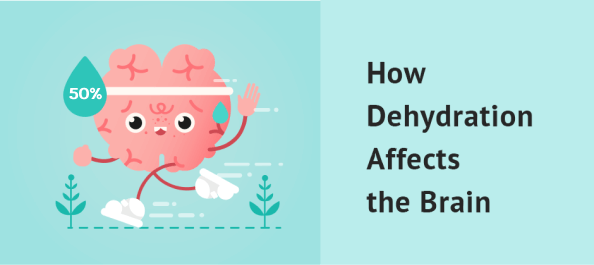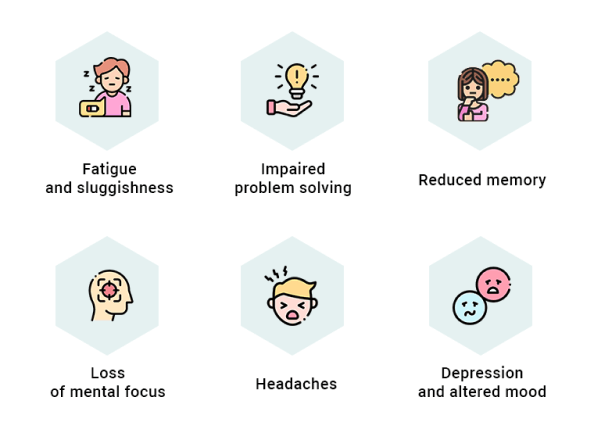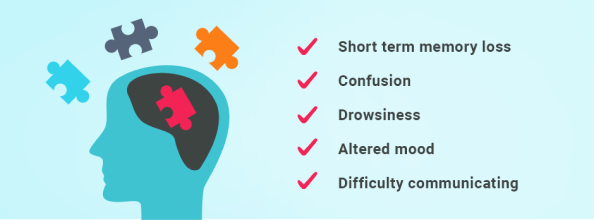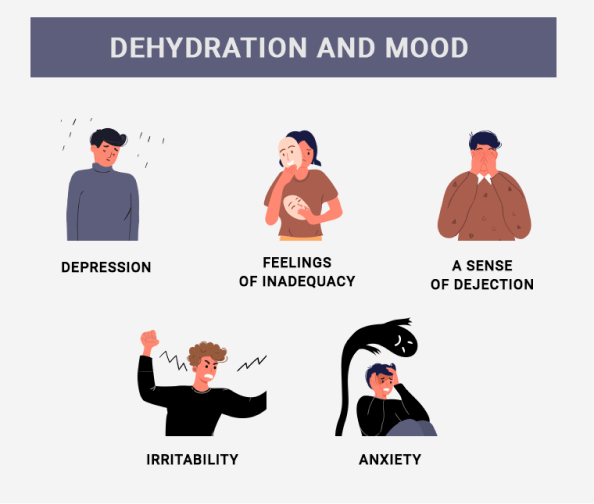
Water is a macronutrient that is vital to human health. You can survive for weeks or even months without food, but you will die within days without water. Yet most people are at least marginally dehydrated, especially when the weather is hot and humid, and it can severely impact your cognitive function.
Effects of Dehydration on the Brain
A properly hydrated brain is about 75% water, so it stands to reason that dehydration will take a toll on mental performance. Moreover, hydration affects your blood volume as well. When your body is dehydrated, your blood volume is reduced, and your blood cells cannot deliver oxygen and nutrients to the brain as efficiently.
A reduction in hydration of as little as 2% can impact your cognitive function in multiple ways:
- Fatigue and sluggishness
- Impaired problem solving
- Reduced memory
- Loss of mental focus
- Depression and altered mood
- Headaches

People often misinterpret these symptoms and turn to caffeine to stimulate their brains. But caffeinated beverages have a diuretic effect that causes even more dehydration, and symptoms are likely to return once the effects of the caffeine wear off.
Can Dehydration Cause Memory Loss?
Dehydration can affect memory in people of all ages, especially the elderly. Memory loss is a key sign of dementia, and a reduction of as little of 2% of body weight due to water loss can elicit symptoms that mimic dementia, including:

- short term memory loss
- confusion
- drowsiness
- altered mood
- difficulty communicating
People often attribute lapses in memory — like forgetting what you were looking for, or losing your car keys — to getting older. But in fact, dehydration may be the culprit in short-term memory loss.
Dehydration and Elderly Dementia
There is growing evidence to suggest that dehydration plays a key role in dementia and Alzheimer’s disease in older adults. Dehydration is a common condition among the elderly for several reasons:
- Pharmaceuticals often have a diuretic effect that causes dehydration.
- Toileting is a challenge for older adults, and they often avoid fluids to keep from having to urinate.
- Caregivers may fail to provide adequate fluids to older patients for the same reason.

Multiple studies have established a strong link between dehydration and dementia, although it is not completely clear whether dehydration is a cause or an effect of dementia. However, what is clear is that older adults tend to be dehydrated, and staying hydrated can positively affect the health and quality of life of senior citizens.
Dehydration and Mood
Being dehydrated slows down your brain function in general, and it can definitely impact your mood. One reason is that serotonin is an important neurotransmitter that regulates your mood, and adequate serotonin levels are dependent on amino acids, which in turn are dependent on sufficient fluids.
Reduced availability of amino acids to the brain can cause many mood-related symptoms, such as:
- Depression
- Feelings of inadequacy
- A sense of dejection
- Irritability
- Anxiety

One study found that moderate dehydration did not significantly impair cognitive performance in young adults, but it had a profound effect on mood.
Hydration therapy is used to help patients with depression, anxiety, sleep disorders and PTSD. Many people try to address mood issues through substance abuse or antidepressant drugs, when hydration therapy may be all that is needed.
Our Brain Tonic Therapy Helps Prevent Brain Dehydration
Being dehydrated slows down your brain function in general, and it can definitely impact your mood. One reason is that serotonin is an important neurotransmitter that regulates your mood, and adequate serotonin levels are dependent on amino acids, which in turn are dependent on sufficient fluids.
Ingredients include:
- Saline solution
- Electrolytes
- Amino acids
- B Vitamins
- Vitamin C
- MIC
- Glutathione
- NAD booster
If you are feeling sluggish, forgetful, moody and irritable, contact Advanced Cryo NYC today, and see what a difference Brain Tonic IV therapy can make in your energy levels and sense of mental wellbeing.
Resources
Adan, Ana. “Cognitive performance and dehydration.” Journal of the American College of Nutrition 31.2 (2012): 71-78.
Pross, Nathalie. “Effects of dehydration on brain functioning: A life-span perspective.” Annals of Nutrition and Metabolism 70.Suppl. 1 (2017): 30-36.